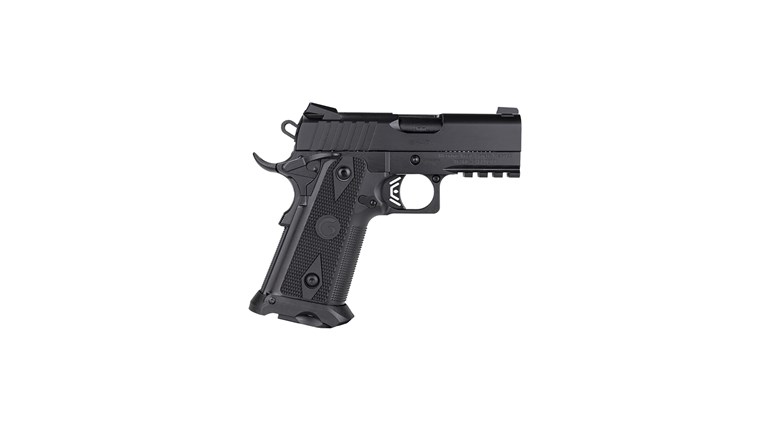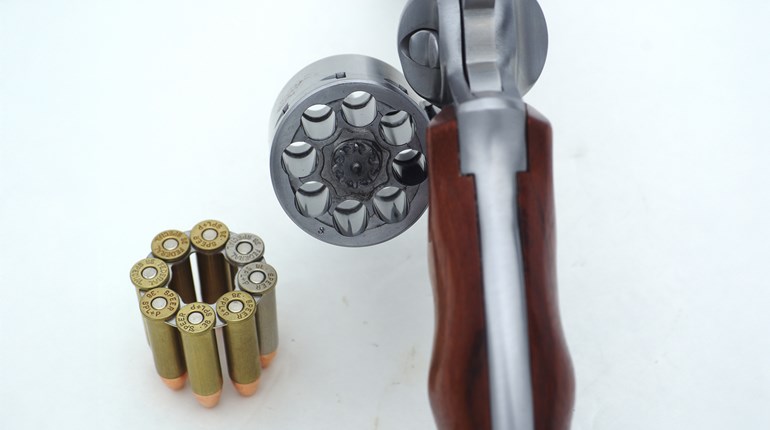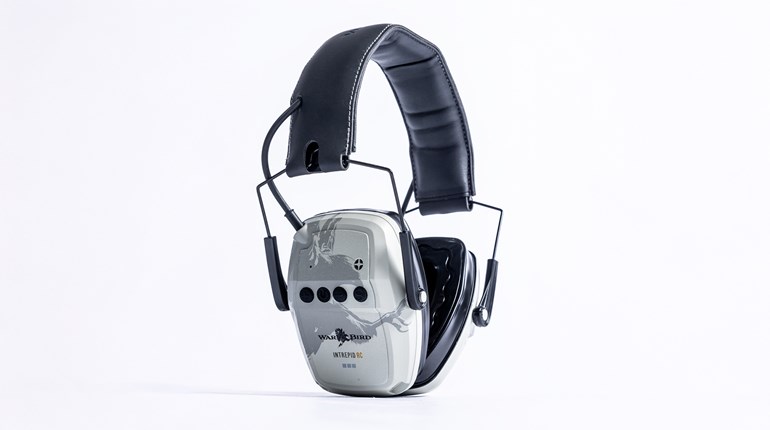
The success of the PPQ and Q5 Match pistols led Walther to introduce the Q5 Steel Frame model in 2019. With a heavy steel frame, this optics-ready gun was competition-ready right from the box and found its way into many shooters’ holsters. However, the gun was a little large for duty use, so the engineers at Walther worked on a follow-up model. The Walther Q4 Steel Frame (MSRP: $1,399, $1,499 for optics-ready, waltherarms.com) was launched earlier this year with two different models.

The standard model is chambered in 9 mm with a four-inch barrel and full-length dust cover, tipping the scales at 39.7 ounces. There is also the Optics-Ready version with removable plate, allowing for the mounting of several different optics. Walther engineers worked on balancing out the 40 ounces of weight in this model, making it easier to shoot and take advantage of the great Quick Defense Trigger the previous models are known for.
Walther pistols are known for great ergonomics, and with the new redesigned beavertail on the Q4SF the gun feels great in the hand. Also found on this model are the one-piece, wrap-around style grip with the Performance Duty Grip Texture developed by Walther to provide a premium and functional grip. The texture of the grip is aggressive to maintain your grip. However, its tetrahedron design is nonabrasive. This is an important feature, as this gun is designed to be carried as a duty or self-defense firearm. Most will want to conceal carry it, so having something that isn’t abrasive against your skin or clothing is a nice feature.
The magazine release is reversible and is recessed into the frame; however, the button is large and easy to operate. The same can be said about the ambidextrous slide release levers, which are also easy to operate but do not stick out from the frame. The Quick Defense Trigger is unchanged in the Q4SF model, still having a safe two-stage trigger with crisp break and short reset. The first stage allows for a consistent prep into a distinct wall, then into the second stage of the crisp break. For a carry gun, having that wall feature makes it easy to find in a stressful situation. Follow-up shots are fast and easy, with a reset that measures one-tenth of an inch. The reset skips the first stage and allows for the shooter to press the trigger only a tenth of an inch for fast follow-up shots.

As much as I love my Q5 Match and Q5SF guns, the Q4SF balances much nicer in my hands. One of the biggest reasons for this is the Duty Optimized Beavertail. Walther did this for two reasons, for higher grip and to better fit the retention hoods on duty holsters. What they did in the process is remove a bunch of metal that to some on the Q5SF beavertail was excessive and didn’t necessarily feel as good as the polymer grip on the Q5 Match. The Q4SF feels better in the web of my hand. It also aids in better concealment, with its smooth rounded design and better comfort—especially if carried appendix.
At the range, I worked with the Q4SF from my competition holster as well as the Dale Fricke Archangel AIWB holster that I use to carry my Q5 Match. I had to loosen the retention up some on the carry holster, but it worked just fine. I was running several different 9 mm loads, including Federal 150-grain and 130-grain Syntech Action Pistol, SIG Match Elite 147-grain, Precision Delta 147-grain remanufactured and some 98-grain Federal frangible rounds. I had with me that day a PPQ four-inch Q5 Match, Q5SF and the new Q4SF. The PPQ four-inch is a nightstand gun with mounted light, the Q5 Match has been my daily carry for over a year now and the Q5SF model has been my Carry Optics division gun with Trijicon SRO red-dot optic.
I ran through some familiar drills and target engagements with each pistol at first, but then settled on really comparing the Q5 Match and the Q4SF since the Q5 has been my carry gun. As far as times and hits on target, it was about the same between both guns. The Q5 has a red fiber-optic front sight compared to the three-dot sights on the Q4SF. It was easier to shoot at speed with the fiber-optic sight. That shouldn’t be a shock, considering that is how my competition guns are set up. Sometimes I struggle with the three-dot sights picking up the front sight at my age anyway. I preferred shooting the Q4SF over the PPQ four-inch, and after a few mags of ammunition downrange was shooting it better than the Q5 Match. The gun just sits in my hand better and feels more solid than the Q5. Again, that shouldn’t be a shock, considering it is metal versus the polymer frame.

I have never had accuracy issues with the Walther pistols—actually, they have all shot just as well as my custom competition guns. I was consistently putting 10 rounds into the upper A/C zone box of a USPSA target at 20 yards with all of the ammunition types used that day. Plus, the trigger was fine for an out-of-the-box striker-fired gun. In fact, many consider the Walther to be one of the best striker-fired guns right out of the box and this one was no exception. I am a little spoiled now that I have upgraded the trigger in the Q5SF to the flat Overwatch Precision trigger, but those are competition triggers. For a carry gun the Q4SF trigger is fine, not as smooth as the well-shot and worn-in trigger on the Q5 Match polymer model, but it didn’t cause any issues shooting the gun accurately at speed at targets from five to 20 yards.
At 39 ounces, you will notice the gun on your hip; however, I wore the Q4SF in the Dale Fricke holster for several days and found it to be comfortable to wear all day with no issues. You will definitely want a sturdy belt with the additional weight of the steel gun. The holster was actually for the five in Q5 Match, but the added inch of material helped keep the gun balanced on the belt. The grip was not aggressive against skin or clothing.
I am tough on guns, not big on maintenance, and usually just take them straight to the range when receiving them and start shooting. With the all-steel guns I added a little Hoppe’s oil to the rails before hitting the range, and then shot this one during two different trips for about 2,000 rounds. I experienced no malfunctions during any of the shooting with the variety of test ammunition that I used. I did like shooting the gun with the 150-grain Federal Syntech Action Pistol ammunition, as it was very soft shooting—so much so that it barely trickled out of the gun during extraction—but didn’t cause any issues. The gun is designed to be a duty gun and this is competition ammunition, but it ran.
With its 15-round capacity, Quick Defense Trigger, Duty Grip Texture and Duty Optimized Beavertail, Walther has put together a winning combination for a duty and carry gun built of steel. I like the feel of the grip so much that I have been running the Q4SF frame with the Q5SF slide on it for some matches. The Q4SF frame has one inch less of the dust cover than the Q5SF frame, taking some weight out of the nose of the gun. I am also excited about trying the Q4SF Optics-Ready model, not only for carry but in matches as well.
Article from the November/December 2020 issue of USPSA’s FrontSight magazine. Photos by Isabel Martens.
Read more: 2020 Holiday Gift Guide


































